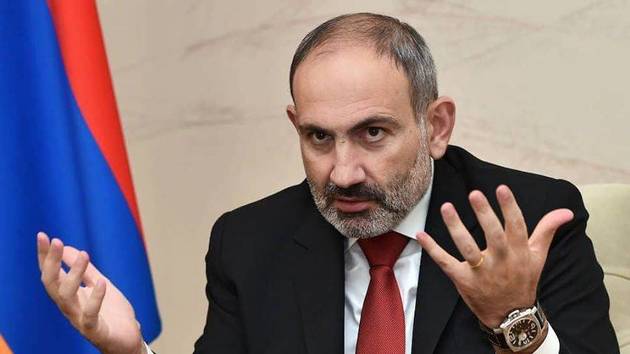On the eve of the 75th anniversary of the victory over fascism at the international level, historical discussions once again flared up on the interpretation and assessment of the role of some problematic participants of the Second World War. This kind of discussions often transpose into the political dimension, Daily News Hungary writes in the article 75th anniversary of VE: The monument to Garegin Nzdeh as a test for Nikol Pashinyan. Thus, in November, the third committee of the UN General Assembly on social and humanitarian issues adopted by a majority vote a draft resolution on combatting the glorification of Nazism.
The WWII, having claimed the lives of tens of millions of people all around the world, to this day continues to keep old wounds alive. For instance, Ukraine and Poland have been quarreling for many years because of the ambiguous personality of the Ukrainian nationalist Stepan Bandera.
Likewise, today the issue of assessing the personality of the Armenian nationalist Garegin Nzdeh is also becoming increasingly relevant. Notably, the problem of the glorification of Nzdeh was raised for the first time at the international level by the President of Azerbaijan, and today it is in the spotlight of attention within the world Jewish community. President Aliyev discussed this issue during his meeting with Malcolm Hoenlein, the executive vice-chairman of the Conference of Presidents of Major American Jewish Organizations. The leading media organizations of Russia, – the country which, for understandable historical reasons, is especially sensitive to the glorification of accomplices to fascism, – also picked up the topic. The President of Azerbaijan indeed took quite a balanced position during the meeting of the Council of CIS Heads of State in Ashgabat on October 11, 2019.
The glorification of Nzdeh began during the reign of the previous administrations of Armenia. As a matter of fact, the previous leaders of Armenia, namely Robert Kocharian and Serzh Sargsyan, repeatedly expressed their sympathies for the philosphy of “Tseghakronism” founded by Garegin Nzdeh, – an ideology that incorporated the fascist ideas characteristic of Europe during the 1930s.
The proximity between Hitler’s racial ideology and Nzdeh’s philosophical writings has been mentioned in papers and articles of many European experts, including Volker Jacoby and Thomas de Waal.
One of the latest critical articles in relation to tolerance for Nzdeh’s ideological legacy was written in Germany, by a German linguist, Matthias Wolf. In his article dated November 13, 2019, he talks about a monument to Garegin Nzdeh in the old Bulgarian capital, Pliska. In fact, the initiative of establishing a monument to Garegin Nzdeh in Bulgaria, which is mentioned by Wolf, can be considered as a precarious move from different points of view. It is not about the national movement of the Armenian diaspora, which sought to to perpetuate Nzdeh’s actions in the public, but about the initiative to build the monument in the territory of a private ownership, – in the so-called “Cyrillic courtyard” in Pliska. Many experts questioned whether the character of Nzdeh is suitable for the “Cyrillic courtyard”. Nzdeh’s works were mostly written in Armenian, and Cyrillic is by no means an Armenian alphabet. Armenians have their own very interesting graphic signs, and they are proud of it. However, they do not even have an indirect relationship to the Cyrillic alphabet. Besides, while different nations can be proud of numerous merits and achievements of their heroes, Armenian heroes, such as Nzdeh, Andranik or Dro Kananian, unfortunately, have too much human blood on their conscience, especially relating to the period of 1920s.
Indeed, Nzdeh closely cooperated with the Nazis during the entire period of the WWII. Along the way, Wolf did not miss the fact of the attacks by the Armenian armed forces on the Azerbaijani civilian population in Nagorno-Karabakh at the beginning of the 20th century. Wolf refers to Garegin Nzdeh as the inspirer and leader of the pogroms against the Azerbaijanis in Nagorno-Karabakh in the years 1918-1920. While talking about the aspirations of the current leadership of Armenia to perpetuate Nzdeh’s image, Wolf characterizes this fact as a demonstration of power in a foreign territory, as well as “the shameful abuse of tolerance, hospitality and solidarity of the peoples of other countries”. He recalls that the worshipping of Nazi personalities and symbols has long been the subject of criticism of various UN resolutions.
Despite the facts provided above, there is an opinion in the expert community that the attitude to Garegin Nzdeh’s personality can be a turning point for the current authorities of Armenia. This may be a decent chance for Prime Minister Nikol Pashinyan to abandon the position of radical nationalism promoted by his predecessors and establish himself as a democrat in the modern history of Armenia. Of course, achieving this goal will require the political will from the national leader, who is not afraid to disassociate himself from decades of nationalism. Nikol Pashinyan’s turn in this direction could also be applied in the process of the settlement of the Nagorno-Karabakh conflict between Armenia and Azerbaijan. In contrast, adherence to Nzdeh’s philosophy of “Tseghakronism” will not allow Pashinyan to prepare the Armenian society for the compromises, so necessary for Armenia to get out of the conflict with the Republic of Azerbaijan.






